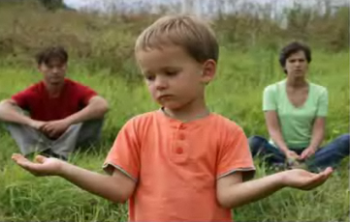Parental Alienation 911
 Jill Egizii and Family Law Judge Michele Lowrance have teamed together to create the workbook “Parental Alienation 911,” which is a compilation of research, expert interviews and solutions to apply to real cases.
Jill Egizii and Family Law Judge Michele Lowrance have teamed together to create the workbook “Parental Alienation 911,” which is a compilation of research, expert interviews and solutions to apply to real cases.
Jill is an alienated mother and the President of the Parental Alienation Awareness Organization, and Michele has been a Domestic Relations Judge since 1995 and frequently appears on nationally syndicated TV and radio shows.
You can learn more about their work and their book by visiting the “Parental Alienation 911” website. A video of their interview is available at the bottom of this article.
Men’s Rights: You each have written books dealing with divorce and alienation so what made you want to combine forces to put together this book?
Jill Egizii: With my book “The Look of Love” and Michele’s book “The Good Karma Divorce,” we have two very different books, but we’re working towards the same goal for a change in divorce culture for increased awareness and education.
This workbook, we felt, was so important to alienated parents and legal and mental health professionals because its information was out there in pieces but never had been assembled into one great work that was going to really help people through the journey of parental alienation, and then help others to understand the dynamic.
I think you have to look at Michele and what she’s doing in Chicago in her courtroom —and really statewide now because she’s teaching all the judges in Illinois.
There’s never been a book by a sitting family court judge that has so much incredible knowledge to add to the advocacy part of it, which was my part.
Men’s Rights: For whom is this book intended?
Judge Michele Lowrance: Our original motivation for this was Jill alone gets — I may be exaggerating but not by much — hundreds of phone calls a day with people who really need help.
When we do our radio show on parental alienation twice a month, we get all these calls and all these people in the chat room and one of the themes that we were seeing that was unique to parental alienation is that they were really getting emotionally destroyed.
Couple that with not really doing all that they could to be doing to help themselves and a lot of times sabotaging themselves in court because they were becoming reactive to the bad behavior of the alienating parent.
There was so much people didn’t know that they were doing to hurt themselves and Jill couldn’t possibly be talking to these people all the time. We felt like we needed to sit down and really write something that helps the people save their own hearts and souls.
I need to tell the people what they’re doing in court that’s not working. I need to give the judicial perspective because, truthfully, a lot of time therapy is not the answer unless it’s reconciliation therapy, which most people don’t get.
Sometimes the only answer is the court, so people rely on us and they need to know how to behave.
 Men’s Rights: Jill, why did you decide to offer this in workbook form? What’s the difference between the format of your book compared to the other books out there that touch on parental alienation?
Men’s Rights: Jill, why did you decide to offer this in workbook form? What’s the difference between the format of your book compared to the other books out there that touch on parental alienation?
Jill Egizii: Being an alienated parent and the child of alienation, it’s all a very difficult process; more difficult than any job you could ever go to. And for me, this is a full-time, unpaid job that I do trying to help people.
I think with the workbook, we wanted people to actually sit down and think about their own personal situation and be able to answer questions and go through exercises that allow them to get to their end goal.
For instance, how to be a better presenter in court if you are representing yourself pro se; how to deal with certain issues of the three levels of parental alienation; and how to deal with a child who is being disrespectful.
The workbook gives people the opportunity to sit down and really put some thought into it other than the sadness and heartbreak that they’re thinking about continuously.
Judge Michele Lowrance: We took a survey between each other and made a list of every single kind of agony you could go through and then addressed each one of them with the skills because the gist of it is to keep people in the fight and keep them from not giving up. They need tools to do this.
It’s so chaotic that we wanted to make sense of everything saying, “You can do this and here’s how.” It’s so much of a “here’s how” book. There are other books and studies that are very clinical and wonderful.
But this is very personal to the person going through it, as well as for lawyers who really need to know how to handle these cases and what their clients are going through.
Jill Egizii: We’ve used information and mentioned people who are in the parental alienation arena, which I always call the big small world of parental alienation, because there’s only a handful of mental health and legal professionals in the world that even understand the dynamic.
We’ve used information from those people, we quoted them, and we put their names out there so that people like me who 8 years ago had no idea what was out there as far as resources can refer to these names, go to their websites, and look up the information they have put out there.
Men’s Rights: Finally, I wanted to ask you, Michele, since we have the rare opportunity to talk with an actual sitting family law judge, how prevalent is parental alienation evident in cases that come before you? Have you noticed an increase or decrease in the amount of alienation found or do you find people are more aware of parental alienation?
 Judge Michele Lowrance: Let me give you an interesting, unfortunate statistic. There’s a study that shows that 80% of all cases have some form of parental alienation. In 20% of those cases, it happens on a daily basis.
Judge Michele Lowrance: Let me give you an interesting, unfortunate statistic. There’s a study that shows that 80% of all cases have some form of parental alienation. In 20% of those cases, it happens on a daily basis.
When I wrote the book, I felt that there was a lot of damage happening to children just because of the way this system is and just because usually it’s the fathers who have to fight for expanded visitation and going beyond the 15%, even with very involved fathers.
Because we are in a blame-based system, people come in the adversarial mode of mother against father, which too often breeds “to make yourself feel secure, you want to marginalize the other parent.” People think that enhances their safety with their child, and by safety I mean security.
So I think it happens way too much, even in the lightweight cases. It’s not even okay to raise your eyebrow when the visiting parent comes.
The point of it is for the judges and the lawyers to know how to nip it in the bud because it doesn’t get better. It doesn’t usually resolve itself. It usually gets worse so you really need to know what to do early on and we’ve made some of those suggestions.
Men’s Rights: Parental alienation has grown into a huge issue that hopefully doesn’t continue to keep growing.
Judge Michele Lowrance: And parental alienation is mainly against dads. There are plenty of alienated moms but mainly the statistics show it is dads.
Dads and your following need to know how this happened in very, very small stages as part of just general parenting. You need to really understand what a little bit of this kind of behavior can do. Statements like “your father left us” or “your father had better things to do than come. He had to go out with his girlfriend.”
A statement like that is very damaging to children and very damaging to the relationship. So you want to teach your readers and listeners how to at least be aware of early indicators of parental alienation because sometimes, people can’t believe it’s possible.
A parent could say those things and not really understand the damage they do to the alienation parent and the children because the majority of people do love their children. They don’t want to hurt their children.
They just need to be educated on why these things are damaging, how it destroys children’s brain development, and how it destroys their ability to feel safe in the world.
